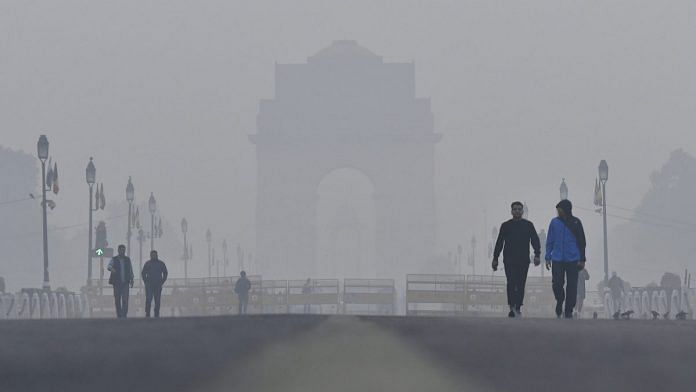New Delhi: The rise of Covid-19 cases in the national capital and Mumbai, the two worst affected cities in India, is linked to their air pollution levels, experts have said.
Speaking to ThePrint, health and climate experts said higher air pollution levels in these cities over a prolonged period have compromised the population’s immunity, making them more susceptible to the coronavirus.
“There is definitely a link between air pollution and the surge of Covid-19 patients in cities like Delhi and Mumbai,” said Dr Rommel Tickoo, associate director, internal medicine at Max Hospital, Delhi.
Delhi and Mumbai are among the worst polluted cities in India, which itself is home to at least two-thirds of the world’s most polluted cities. The country has, however, witnessed a dip in air pollution levels after the Covid lockdown was enforced on 25 March.
But populations that are exposed to pollution over a prolonged period will find that their immunity is compromised, the experts said. Tickoo said chronic exposure to air pollutants such as particulate matter, nitrogen dioxide and sulphur dioxide is bound to irritate our lungs.
“If you are already living in a city where people are having issues because of chronic exposure to air pollution, then you are going to have issues when there is a pandemic,” he said.
His comments echoed an April study conducted by researchers Xiao Wu and Rachel Nethery at the Harvard University, which found that a small increase in fine particulate matter will have an ‘outsized’ effect in the US. An increase of 1 microgram per cubic metre would lead to a 15 per cent increase in Covid-related deaths, it said.
“The evidence we have is pretty clear that people (who) have been living in places that are more polluted over time, that they are more likely to die from coronavirus,” said Aaron Bernstein, the director of the Center for Climate, Health and Global Environment at Harvard University.
As of Thursday, Delhi recorded 70,390 cases and Mumbai 69,625 cases.
Also read: India’s Covid testing has doubled in June, but positivity rate still around 7-8%
Immunity factor
Speaking about Covid cases in Delhi, Tickoo said, “There have been a combination of cases where respiratory infection, heart disease with Covid-19 has triggered a cardiac arrest.”
Dr S. Chatterjee, senior consultant, internal medicine, Apollo Hospital, said studies conducted so far have attributed higher mortality rate in highly polluted cities.
Due to the pollution in Delhi, several people suffer from asthma, chronic bronchitis and other lung diseases. Chatterjee pointed out that this in itself is “considered to be a risk factor for Covid-19”.
“These diseases are counted to be important co-morbidities. People who have co-morbidities fare worse with Covid-19 infection. People who stay in highly polluted cities like Delhi, they will have more of asthma or chronic lung diseases, that’s why studies have found higher mortality among higher pollution areas,” he said.
Pollution may increase ‘transmission’ of virus
On the transmission of Covid, Chatterjee, said, “I would say that there are many observational studies that have found that polluted air may help in the transmission of the virus.”
He also said the transmission of this virus has been found to be higher in areas with increased air pollution. “In the long term, people can land up with fibrosis of the lung which is debilitating. This is because the pollution causes an increased risk to infection and a higher morbidity rate.”
Asked if fine particles in particular played a role in spreading the virus, professor S.K. Satheesh, chairman, Divecha Centre for Climate Change, Indian Institute of Science, Bengaluru, said, “There have been several studies on the transport of virus by sticking to aerosol surface. Most of the continental aerosols are dry, such as dust particles. It is still not clear how long Covid-19 can survive in dry particle surfaces.”
He added, “Residence time in the atmosphere of large aerosol particles, which can carry viruses, is a few days only. While such a possibility exists, we cannot make a conclusive remark at this time as it depends on both the residence time of aerosol particles and the lifetime of the virus on the aerosol particle surface.”
Satheesh does believe that reducing air pollution in cities will have a beneficial effect on preventing Covid and the patient recovery process.
Chatterjee maintained that it will be an “indirect relation”. “Anywhere there is less pollution will have an indirect effect on the recovery of coronavirus patients,” he said.
“It will definitely be beneficial. However, to what extent is up for debate. If air pollution is reduced, there will be increased recovery, otherwise air pollutants will keep irritating an already compromised respiratory system,” added Tickoo.
Also read: Indian scientists find Covid gene in wastewater — a breakthrough in tracking virus outbreak



